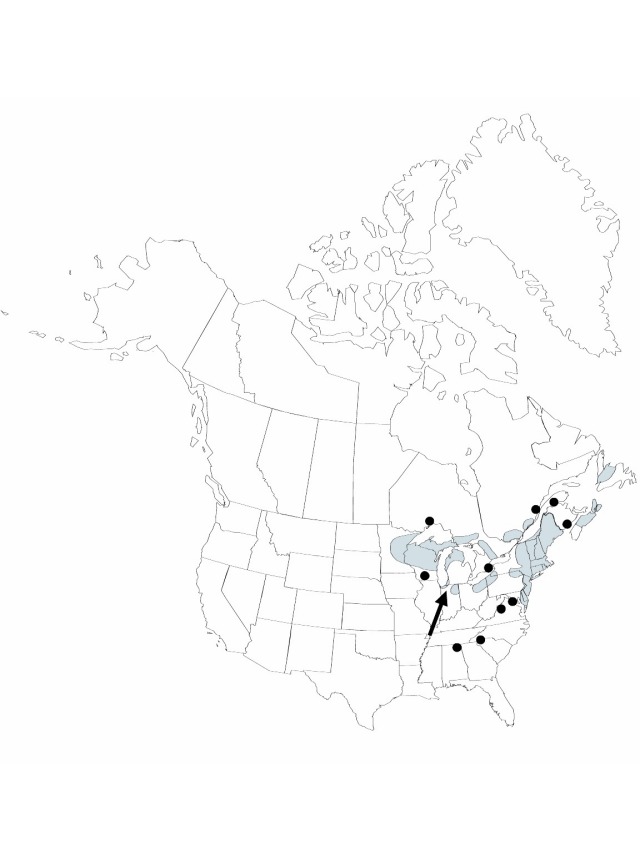Difference between revisions of "Eriocaulon aquaticum"
Pharmaceutical Journal 83:700. 1909.
FNA>Volume Importer |
imported>Volume Importer |
||
| Line 73: | Line 73: | ||
|publication year=1909 | |publication year=1909 | ||
|special status= | |special status= | ||
| − | |source xml=https:// | + | |source xml=https://bibilujan@bitbucket.org/aafc-mbb/fna-data-curation.git/src/bb6b7e3a7de7d3b7888a1ad48c7fd8f5c722d8d6/coarse_grained_fna_xml/V22/V22_574.xml |
|genus=Eriocaulon | |genus=Eriocaulon | ||
|species=Eriocaulon aquaticum | |species=Eriocaulon aquaticum | ||
Revision as of 21:24, 27 May 2020
Herbs, perennial, 4–21 cm (–100 cm when submersed). Leaves linear-attenuate, 1–10 cm (–40 cm when submersed), apex often subulate. Inflorescences: scape sheaths longer (shores) or shorter (submersed) than principal leaves, inflated; scapes linear to filiform, 1 mm wide, (4–)5–7-ribbed; mature heads white to pale gray, young heads dark, hemispheric to globose, 4–10 mm wide, soft, flattened when pressed; receptacle glabrous or rarely with a few clear hairs; involucral bracts becoming reflexed, obscured by proximal bracts and flowers, dark gray, broadly oblong to narrowly ovate or broadly obovate, 1–1.5 mm, margins entire, apex rounded, abaxially with white, club-shaped hairs, otherwise glabrous; inner and receptacular bracts gray to near black, oblanceolate or cuneate, 1.5 mm, margins entire, apex acute, distal margins and abaxial apical surface with white, club-shaped hairs. Staminate flowers: sepals 2, grayish, oblong-linear or linear-oblanceolate, curved, 1.5 mm, apex acute to rounded, margins and abaxial surface with white, club-shaped hairs; androphore club-shaped; petals 2, triangular, nearly equal, 0.5 mm, ciliate, hairs white, club-shaped; stamens 4; anthers black. Pistillate flowers: sepals 2, gray, oblong to narrowly obovate, curved, keeled, 1.5 mm, blade usually ciliate, distal abaxial surfaces with white hairs; petals 2, pale, oblong-linear to linear oblanceolate, 1.5 mm, apex acute to obtuse, apically ciliate, adaxially with white, club-shaped hairs; pistil 2-carpellate. Seeds light brown or red-brown, ovoid to broadly ellipsoid, 0.5 mm, very faintly reticulate, not papillate.
Phenology: Flowering spring–fall.
Habitat: Sandy or peaty, often sphagnous, shores, bogs, muskegs, shallows
Elevation: 0–600 m
Distribution

N.B., Nfld. and Labr. (Nfld.), N.S., Ont., Que., Ala., Conn., Del., Ind., Maine, Md., Mass., Mich., Minn., N.H., N.J., N.Y., N.C., Ohio, Pa., R.I., Vt., Va., Wis., Europe (Great Britain, Ireland).
Discussion
The name Eriocaulon septangulare Withering, widely used for this species, is invalid (H. N. Moldenke 1937). Some (T. G. Tutin et al. 1964–1980, vol. 5) retain E. aquaticum (Hill) Druce as the valid name if one accepts both North American and European plants as the same species (the alternative taken here). If North American plants are considered to be distinct from Eurasian ones, then the appropriate binomial for ours becomes E. pellucidum Michaux.
Selected References
None.